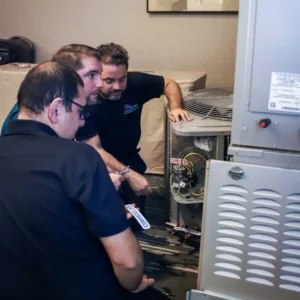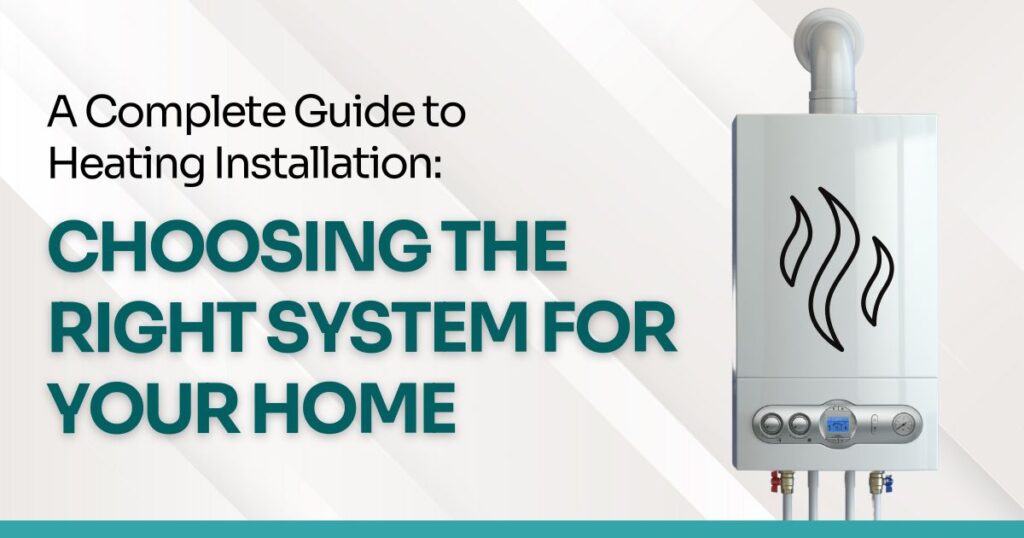 Across different types, makes, and models, heating systems come with a selection of features that influence energy efficiency, longevity, comfort, and more. Choosing the right HVAC system shouldn’t be complicated, which is where Trilogy AC comes in — our expert technicians help you select the ideal system and complete your heating installation safely and efficiently.
Across different types, makes, and models, heating systems come with a selection of features that influence energy efficiency, longevity, comfort, and more. Choosing the right HVAC system shouldn’t be complicated, which is where Trilogy AC comes in — our expert technicians help you select the ideal system and complete your heating installation safely and efficiently.
Types of Heating Systems: Which One is Right for You?
Each type of heating system offers various advantages and drawbacks, and some are better suited to certain homes than others. The best heating system for your home depends on your local climate, home size, budget, fuel preferences, and other factors.
Furnaces
Furnaces are one of the most widely used heating systems. These units use gas, oil, or electricity to generate heat and distribute warm air through ductwork and throughout your home. There are several kinds of furnaces, including:
- Gas furnaces: Powerful and efficient for large spaces, gas furnaces use burners and combustion to generate heat.
- Oil furnaces: More common in rural areas where natural gas isn’t available, oil furnaces also use combustion.
- Electric furnaces: Instead of burners, electric furnaces use heating elements to warm up air before distributing it to your home via ductwork. They’re less powerful than gas furnaces and may be less efficient at heating large spaces.
Furnaces offer fast and powerful heating, and they’re most compatible with homes with existing ductwork. High-efficiency models can significantly reduce energy costs.
Heat Pumps
A heat pump is a versatile HVAC system that provides both heating and cooling for year-round performance. Instead of burning fuel, heat pumps use a heat transfer process similar to refrigerators. During the winter, heat pumps extract heat from outdoors and transfer it inside your home, efficiently warming your home without generating heat. In the summer, the reverse valve switches the heat pump to cooling mode and instead transfers heat from inside your home to outdoors.
There are different types of heat pumps based on where they source heat from, including air-source, water-source, and geothermal heat pumps. Air-source heat pumps are most common and operate efficiently in most climates, and many are equipped with variable-speed compressors and other technology that optimize performance.
Boilers
Boilers keep your home warm by heating water and distributing it through radiators, baseboard heaters, or radiant floor heating. These systems use natural gas, oil, propane, or electricity to heat water, and they provide steady and comfortable heat throughout your home without drying out the air.
Ductless Mini-Splits
Ductless mini-split systems consist of an outdoor compressor unit and one or more indoor air handlers connected by refrigerant lines. Using the same mechanism as heat pumps, mini-splits extract heat from outside and transfer it indoors rather than generating warmth.
With multiple units in a home that operate independently in zones, these systems are ideal for homes without existing ductwork. The heat transfer process and no energy loss through ductwork leaks equate to high efficiency — mini-splits are some of the most energy-efficient heating systems in various climates. Ductless mini-splits often cost more upfront, but they have simple installation, don’t require ductwork installation or maintenance, and offer significant energy bill savings.

Factors to Consider When Choosing a Heating System
Selecting the right heating system involves considering your preferences and factors that influence your home’s heating load.
Home Size and Insulation
A properly sized heating system ensures efficient operation, consistent comfort, and minimal strain on your equipment. Small or well-insulated homes retain heat more effectively than large or drafty buildings, reducing the amount of energy needed to maintain a comfortable temperature.
Energy Efficiency Ratings
Energy efficiency impacts your monthly utility bills and long-term operating costs. Across various types of heating systems, Energy Star-certified models offer high energy efficiency with lower costs and emissions.
For furnaces, look for favorable annual fuel utilization efficiency (AFUE) ratings — this rating measures how efficiently a furnace converts fuel to heat, with higher ratings equating to higher efficiency. Other systems may have seasonal energy efficiency ratio (SEER) ratings, which likewise measure heating output against energy consumption.
Fuel Type and Availability
Consider which fuel type makes the most sense for your home based on energy costs and availability. Gas furnaces, for example, are cost-effective in areas with natural gas infrastructure and homes with existing gas lines. Electricity is widely available, but some areas are subject to higher rates that can drive heating costs up.
Initial Cost vs. Long-Term Savings
High-efficiency systems or models may have a higher upfront cost but provide long-term savings on energy bills. Check for rebates, tax credits, and other savings options for heating systems to offset the cost of a new system.
Heating Installation Process: What to Expect
Professional heating installation follows careful steps to ensure safe operation and peak efficiency. Here’s what to expect from a heating system installation:
- Consultation: Our HVAC experts assess your home and heating needs based on square footage, insulation, layout, fuel type, climate, and other factors.
- System selection: We provide tailored recommendations and transparent estimates.
- Installation day: Technicians install and configure your new system. Most installations are complete within a day, but more complex installations may take longer — your technician can provide a more precise timeline based on their assessment.
- Inspection: We inspect your heating system to verify safe and building code-compliant operation. We’ll walk you through how to use and care for your system to keep it running at its best.
Cost of Heating Installation and Factors That Impact Pricing
Home heating system installation costs vary based on:
- System type: Furnaces, boilers, heat pumps, and mini-splits have different price ranges.
- Home size and layout: Larger homes require more powerful systems, which carry higher costs.
- Complexity: Additional labor and complexity, such as modifying, repairing, or installing ductwork, may increase installation costs.
- Extra features: Smart thermostats, zoning, and other features add to the price but improve energy efficiency and comfort.
Tips for Maximizing Heating Efficiency and Lowering Energy Bills
Optimizing your heating’s energy efficiency involves proper usage and care throughout its operating life. Try these tips:
- Schedule annual maintenance to address wear and minor problems.
- Replace filters every 30 to 90 days depending on usage.
- Use a smart or programmable thermostat to match your daily routine.
- Incorporate zoning systems that direct heat where it’s needed.
- Seal air leaks and upgrade insulation to prevent heat loss.
Why Professional Heating Installation Matters
Improper installation can lead to serious long-term consequences. A poorly installed or improperly sized system may struggle to distribute heat evenly, forcing it to work harder than necessary. This leads to inefficient operation, premature wear, high repair costs, or early replacement. Professional HVAC technicians have the skills and experience necessary to determine the appropriate system size and configuration.
In addition to longevity and efficiency, professional heating installation also ensures safe operation. Technicians verify that ventilation systems, electrical connections, and other components are installed safely to prevent hazards, such as carbon monoxide leaks or gas leaks.

Schedule Your Heating Installation with Trilogy AC
Serving Katy and other Texas areas, Trilogy AC is ready to help you find the best heating system for your home. Contact us to learn more about our heating installation services, or schedule a service online.








